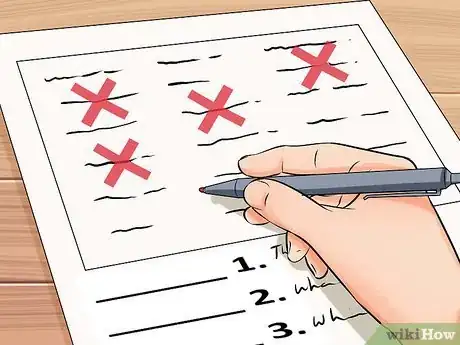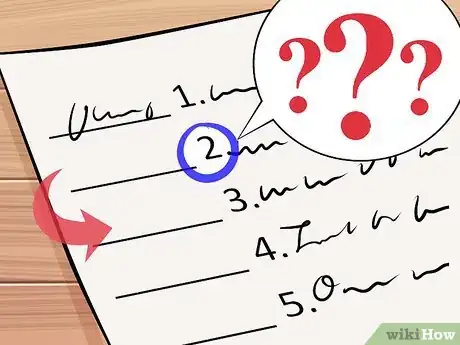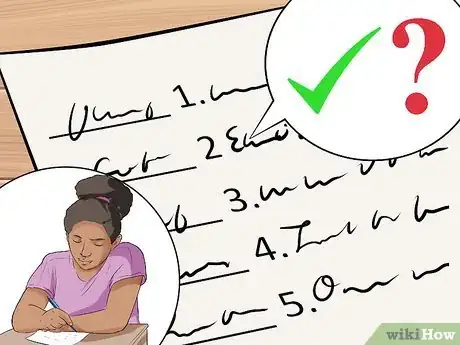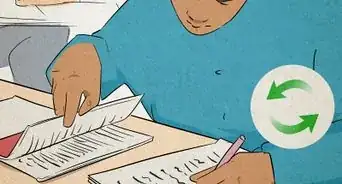This article was co-authored by Jake Adams. Jake Adams is an academic tutor and the owner of Simplifi EDU, a Santa Monica, California based online tutoring business offering learning resources and online tutors for academic subjects K-College, SAT & ACT prep, and college admissions applications. With over 14 years of professional tutoring experience, Jake is dedicated to providing his clients the very best online tutoring experience and access to a network of excellent undergraduate and graduate-level tutors from top colleges all over the nation. Jake holds a BS in International Business and Marketing from Pepperdine University.
There are 17 references cited in this article, which can be found at the bottom of the page.
wikiHow marks an article as reader-approved once it receives enough positive feedback. This article received 20 testimonials and 80% of readers who voted found it helpful, earning it our reader-approved status.
This article has been viewed 240,018 times.
Do you get test anxiety or have poor test taking skills? Passing a difficult test takes preparation. Follow some of these tips to help you pass your tests.
Steps
Studying For the Test
-
1Give yourself enough time to study for the test. Know when the test will be given so it doesn't surprise you. Come up with a schedule so you can have adequate time to study for the test. If the material is easier, you may not need as long as you will if the material is more difficult. Allowing yourself adequate time to study will help you do better.[1]
-
2Study before the test. One of the best ways to pass a test is to study the information every day. Cramming for the test at the last minute is not a good practice and can lead to failure. Instead, spend 30-60 minutes every day studying the material you went over in class that day.
- If you don't want to study every day, spend the week or two before the exam studying every day.[2] This gives you time to revisit concepts you don't quite understand and allows you time to absorb the information.
- If you don't understand something, studying beforehand gives you enough time to ask the teacher about it in class.
- You could make up pop quizzes to test your knowledge on some of the materials that might be on the test.[3]
Advertisement -
3Analyze previous tests. Look at previous tests you have taken in the class. What things did the teacher mark wrong? What kind of things is she/he looking for in answers? Figuring this out can help you study better and improve your answers. Also look at the types of questions your teacher asks. Do they focus mostly on broad concepts or specific examples? This can help you study more effectively.[4]
- Ask your teacher for sample tests.[5] Some teachers and professors will provide sample tests for students. If you are taking a standardized test, it is extremely important to take sample tests to get an idea of how the test will be structured.
- Look at previous homework assignments, too. Many times, teachers will use homework questions on the test, or write questions in a similar way.
-
4Mix up your studying techniques. Instead of studying the same way every night, change how you study. Spend one night reading the textbook, one night learning terms and definitions, one night studying with flashcards, and one night taking practice tests.
-
5Find the most important concepts.[6] While studying, go through your textbook and your class notes. Look for the most important concepts. This may include things that are brought up again and again, concepts that are explained in detail, or things your teacher told you was important.[7]
- Listen closely to your teacher when they lecture. They could give hints about what material will show up on the test. Make a note of this in your notes in case you forget.
-
6Get tutored. If you are struggling with the material, go to a tutoring session. This might be from your teacher or professor, or maybe the school tutoring services. You may also ask a classmate who understands the material to help you.
-
7Make a review sheet. Though you will be reviewing all of your notes and the chapters, you should also make yourself a review sheet. This sheet includes all the major terms, concepts, and ideas that will be on the test. Think of it like the highlights of the material. Having it on this separate sheet makes it easily reviewable and might help you remember it better.[8]
-
8Complete the study guide. If the teacher gives you a study guide, make sure that you complete it. This is a great way to review the material. Many times, teachers will pull questions directly from the study guide or reword questions from the study guide.
- Study guides also help you focus your studying so you study the correct material.
-
9Form study groups. Gather a few classmates from your class to study together. Quiz each other, come up with possible test questions, and use each other's notes to fill in gaps in your own notes. You also can help explain concepts to each other that you might be confused about.
Taking the Test
-
1Talk to your professor or teacher. Before the day of the test, talk to your professor or teacher about the format of the exam. Many teachers will tell you whether the test will be multiple choice, true/false, fill-in-the-blank, or essay. Knowing the format can help you figure out how to study the information.
- Ask your teacher for a study guide. If they won't give you one, ask them for any tips or suggestions for studying so you can prepare.
- Ask your teacher which chapters the test will cover, or ask them to help you review what you should study.
- Ask the professor or teacher for suggestions on how to study for their test.
-
2Get a good night's sleep. The night before the test, make sure you get a restful night's sleep. Don't stay up late cramming. Being sleepy can cause you to forget things or be unfocused. Show up refreshed and ready to take the test.
-
3
-
4Arrive to the test early. Gather what you need for the test the night before.[11] Leave for class so you will arrive 10-15 minutes early; if you are in middle or high school, don't hang around the halls with your friends. Make sure to bring any materials you need, like pens, pencils, blue books, paper, or calculators.
- Take a few minutes to relax before the test. Take a few deep breaths, think positive thoughts, and get comfortable and relaxed.
- Go to the restroom before the test. This will ensure that you are not distracted during the test and focused on needing to use the restroom.
-
5Understand how the test will be graded. Knowing the way the teacher will grade the test can help you approach questions. Will you lose points for incorrect answers? Will you not lose points if it's left blank, or should you guess?[12] Does the teacher give partial credit? These things help you decide how to answer questions you are unsure about.
-
6Read the directions carefully. Before you start answering questions, take a few seconds to read the directions. This will help you eliminate errors. Sometimes there are multiple parts of an answer or a special task you're asked to do. Read the directions to make sure you don't make any unnecessary mistakes.
- For example, some answers may have more than one answer you have to provide. If you have essay tests, you might have to choose 3 or 4 questions to answer.
-
7Stay positive.[13] Keep a positive attitude while taking the test. Feel confident in yourself.[14] Don't think negative thoughts, even if you are struggling. If you start to get too anxious, pause for a moment. Relax and tell yourself that you can do this.[15]
- Don't pay attention to your classmates. If they are working faster or finish before you, that doesn't mean anything. Everyone works at their own pace. Fast work doesn't mean they know everything; they could know nothing and just put something down.
-
8Do deep breathing to calm your nerves. Breathe in for 4 counts, then out for 8 counts. Do this for 2-3 cycles or until you feel calm again.
- Exhaling for twice the amount of time you're inhaling will reset your nervous system and help you feel better.[16]
Answering Questions
-
1Plan your time. Look at the entire test. Decide how you will approach the questions. Think about how many minutes you will need for each section. Set a pace for yourself that gives you enough time to complete the questions, but that also ensures you will finish the test.[17]
- Start with the easiest sections. Not only will these be completed faster, but breezing through these can help build your confidence.
- Answer the questions with the highest point values next. You want to make sure you give yourself enough time to finish those.[18]
-
2Eliminate incorrect answers. For multiple choice questions, eliminate answers that are obviously wrong, and spend some time figuring out which others cannot be the correct answer.[19] Then look for clues in the answers that make one of the remaining answers incorrect. If the question only needs one right answer, something about one of the choices will be wrong.
- Don't be thrown by questions that include never, not, least, none, or except. These words can give you important insights into the answer, or help you eliminate wrong answers[20] . If you're completely stumped and have to guess a 'true or false' answer, questions that have highly opinionated words such as "always" and "never" are usually false.
- You may want to formulate your own answer after reading the question but before you look at the choices. This can help prevent the answers from swaying you the wrong way.
-
3Plan out essay answers. Essays require you to demonstrate your knowledge. Read the question carefully and underline key words, especially words like define, compare, or explain. Make an outline of the ideas you want to include in your answer. This way you won't forget anything as soon as you start writing. An outline also gives you a map to follow.[21]
- Answer the question directly by mentioning key words or the topic of the question.
- Give examples along with general information about the topic. Use any terms you have learned in the class.
- Write legibly. Your teacher can't mark something they can't read. If you have trouble writing neatly, try to improve your handwriting as much as you can before you take the test.
-
4Skip questions you don't know. Instead of wasting time stressing about questions you don't know how to answer, move ahead on the test. Circle the question and come back to it if you have time. Answer all the questions you know before you spend too much time trying to figure out answers to questions.[22]
- Look through the rest of the test for clues that might help you answer questions you don't know.
- Ask your teacher for clarification if you don't understand what a question is asking.
-
5Review your answers. When you finish your test, go back and review your answers. Reread and spend a few more moments on questions you were unsure about. Double check that you didn't skip any answers or misread questions.[23]
- Trust your first instinct. Many times, your first instinct is the correct answer. But make sure you have made a reasoned decision for the answer, not just relied on your gut.
Expert Q&A
-
QuestionHow do you keep from being nervous during a test?
 Jai FlickerJai Flicker is an Academic Tutor and the CEO and Founder of Lifeworks Learning Center, a San Francisco Bay Area-based business focused on providing tutoring, parental support, test preparation, college essay writing help, and psychoeducational evaluations to help students transform their attitude toward learning. Jai has over 20 years of experience in the education management industry. He holds a BA in Philosophy from the University of California, San Diego.
Jai FlickerJai Flicker is an Academic Tutor and the CEO and Founder of Lifeworks Learning Center, a San Francisco Bay Area-based business focused on providing tutoring, parental support, test preparation, college essay writing help, and psychoeducational evaluations to help students transform their attitude toward learning. Jai has over 20 years of experience in the education management industry. He holds a BA in Philosophy from the University of California, San Diego.
Academic Tutor Deep breathing can be really helpful in calming your nerves during a test. Whenever you start to feel anxious, pause and breathe in for 4 counts, then out for 8 counts. Repeat this cycle until you feel calm again.
Deep breathing can be really helpful in calming your nerves during a test. Whenever you start to feel anxious, pause and breathe in for 4 counts, then out for 8 counts. Repeat this cycle until you feel calm again. -
QuestionHow can students transition from homeschool to regular school?
 Jake AdamsJake Adams is an academic tutor and the owner of Simplifi EDU, a Santa Monica, California based online tutoring business offering learning resources and online tutors for academic subjects K-College, SAT & ACT prep, and college admissions applications. With over 14 years of professional tutoring experience, Jake is dedicated to providing his clients the very best online tutoring experience and access to a network of excellent undergraduate and graduate-level tutors from top colleges all over the nation. Jake holds a BS in International Business and Marketing from Pepperdine University.
Jake AdamsJake Adams is an academic tutor and the owner of Simplifi EDU, a Santa Monica, California based online tutoring business offering learning resources and online tutors for academic subjects K-College, SAT & ACT prep, and college admissions applications. With over 14 years of professional tutoring experience, Jake is dedicated to providing his clients the very best online tutoring experience and access to a network of excellent undergraduate and graduate-level tutors from top colleges all over the nation. Jake holds a BS in International Business and Marketing from Pepperdine University.
Academic Tutor & Test Prep Specialist Many bridge programs help homeschooled students to experience the classroom environment and interact with peers. University campuses offer summer bridge programs where high school students who have over 3.0 can attend classes at the university level with other college students. Besides this, local colleges offer a writing grammar workshop and a science workshop for high school students. Homeschoolers can study in high school classes there. The grad school students work there with a small group and teach to get their teaching hours.
Many bridge programs help homeschooled students to experience the classroom environment and interact with peers. University campuses offer summer bridge programs where high school students who have over 3.0 can attend classes at the university level with other college students. Besides this, local colleges offer a writing grammar workshop and a science workshop for high school students. Homeschoolers can study in high school classes there. The grad school students work there with a small group and teach to get their teaching hours. -
QuestionHow can you successfully deal with sections that test reasoning skills?
 Jake AdamsJake Adams is an academic tutor and the owner of Simplifi EDU, a Santa Monica, California based online tutoring business offering learning resources and online tutors for academic subjects K-College, SAT & ACT prep, and college admissions applications. With over 14 years of professional tutoring experience, Jake is dedicated to providing his clients the very best online tutoring experience and access to a network of excellent undergraduate and graduate-level tutors from top colleges all over the nation. Jake holds a BS in International Business and Marketing from Pepperdine University.
Jake AdamsJake Adams is an academic tutor and the owner of Simplifi EDU, a Santa Monica, California based online tutoring business offering learning resources and online tutors for academic subjects K-College, SAT & ACT prep, and college admissions applications. With over 14 years of professional tutoring experience, Jake is dedicated to providing his clients the very best online tutoring experience and access to a network of excellent undergraduate and graduate-level tutors from top colleges all over the nation. Jake holds a BS in International Business and Marketing from Pepperdine University.
Academic Tutor & Test Prep Specialist You do not have to see just what matches your answer but instead critically look at each answer choice. You can utilize these rules to eliminate the wrong answers. If there is something that is not from the passage in the answer choice, it's the wrong answer. The next is to see if there are overstatements or the use of overly exclusive or inclusive language. If you find things that hint at saying that everybody likes this, or nobody likes this idea, it is probably not the correct answer. So extreme answer choices are often wrong. The last would be to try and avoid social tautologies. These are things that sound good. For example, they may say the moral of the story is don't commit a crime or don't steal. That is probably the wrong answer. The things that sound right are ultimately irrelevant.
You do not have to see just what matches your answer but instead critically look at each answer choice. You can utilize these rules to eliminate the wrong answers. If there is something that is not from the passage in the answer choice, it's the wrong answer. The next is to see if there are overstatements or the use of overly exclusive or inclusive language. If you find things that hint at saying that everybody likes this, or nobody likes this idea, it is probably not the correct answer. So extreme answer choices are often wrong. The last would be to try and avoid social tautologies. These are things that sound good. For example, they may say the moral of the story is don't commit a crime or don't steal. That is probably the wrong answer. The things that sound right are ultimately irrelevant.
Warnings
- Don't cheat. Even if you don't care about the immoral nature of cheating, the odds of getting away with it are next to none. The consequences are too great to try.⧼thumbs_response⧽
References
- ↑ https://uplb.edu.ph/all-news/uplb-topnotchers-give-board-exam-tips/
- ↑ Jake Adams. Academic Tutor & Test Prep Specialist. Expert Interview. 20 May 2020.
- ↑ Ted Coopersmith, MBA. Academic Tutor. Expert Interview. 12 May 2021.
- ↑ https://www.topuniversities.com/student-info/health-and-support/exam-preparation-ten-study-tips
- ↑ Jake Adams. Academic Tutor & Test Prep Specialist. Expert Interview. 20 May 2020.
- ↑ Jai Flicker. Academic Tutor. Expert Interview. 20 May 2020.
- ↑ http://www.study-habits.com/how-to-pass-test-exam
- ↑ https://www.butte.edu/cas/tipsheets/studystrategies/studybio.html
- ↑ https://files.eric.ed.gov/fulltext/EJ876514.pdf
- ↑ https://courses.lumenlearning.com/suny-home-health-aide/chapter/food-nutrition-and-meal-preparation/
- ↑ https://opentextbc.ca/studentsuccess/chapter/test-taking-strategy/
- ↑ https://cft.vanderbilt.edu/guides-sub-pages/grading-student-work/
- ↑ Jai Flicker. Academic Tutor. Expert Interview. 20 May 2020.
- ↑ https://www.oxford-royale.com/articles/positive-mindset-exams/
- ↑ Jai Flicker. Academic Tutor. Expert Interview. 20 May 2020.
- ↑ Jai Flicker. Academic Tutor. Expert Interview. 20 May 2020.
- ↑ Jake Adams. Academic Tutor & Test Prep Specialist. Expert Interview. 20 May 2020.
- ↑ https://www.uco.edu/student-resources/files/dss/tips-in-test-taking.pdf
- ↑ https://www.educationcorner.com/multiple-choice-tests.html#:~:text=Use%20the%20process%20of%20elimination,of%20selecting%20the%20correct%20answer.
- ↑ https://www.unco.edu/student-academic-success/academic-success/academic-success-resources/pdf/SAS_test_taking.pdf
- ↑ https://www.student.unsw.edu.au/essay-exams
- ↑ https://students.unimelb.edu.au/academic-skills/explore-our-resources/exam-prep/online-exam-day-tips
- ↑ https://students.unimelb.edu.au/academic-skills/explore-our-resources/exam-prep/online-exam-day-tips
About This Article
If you’re nervous about whether or not you’re going to pass a test, set aside about an hour a day to study every day for the week leading up to the test. The night before the test, read over the chapter and practice with flashcards, practice questions, and vocabulary terms. However, you should be sure to leave yourself 8-10 hours to get a good night’s sleep so you’ll feel rested and alert during the test! Keep reading to learn how a study group can help you pass the test!






















































































